December 30, 2025 | 18:33 GMT +7
December 30, 2025 | 18:33 GMT +7
Hotline: 0913.378.918
December 30, 2025 | 18:33 GMT +7
Hotline: 0913.378.918
On July 13, in Can Tho city, Prime Minister Pham Minh Chinh chaired a working program with ministries, branches and localities on the Sustainable Development of One Million Hectares of High Quality and Low-Emission Rice Associated with Green Growth in the Mekong River Delta By 2030 Project (in short, Project of One Million Hectares of High-quality Rice).
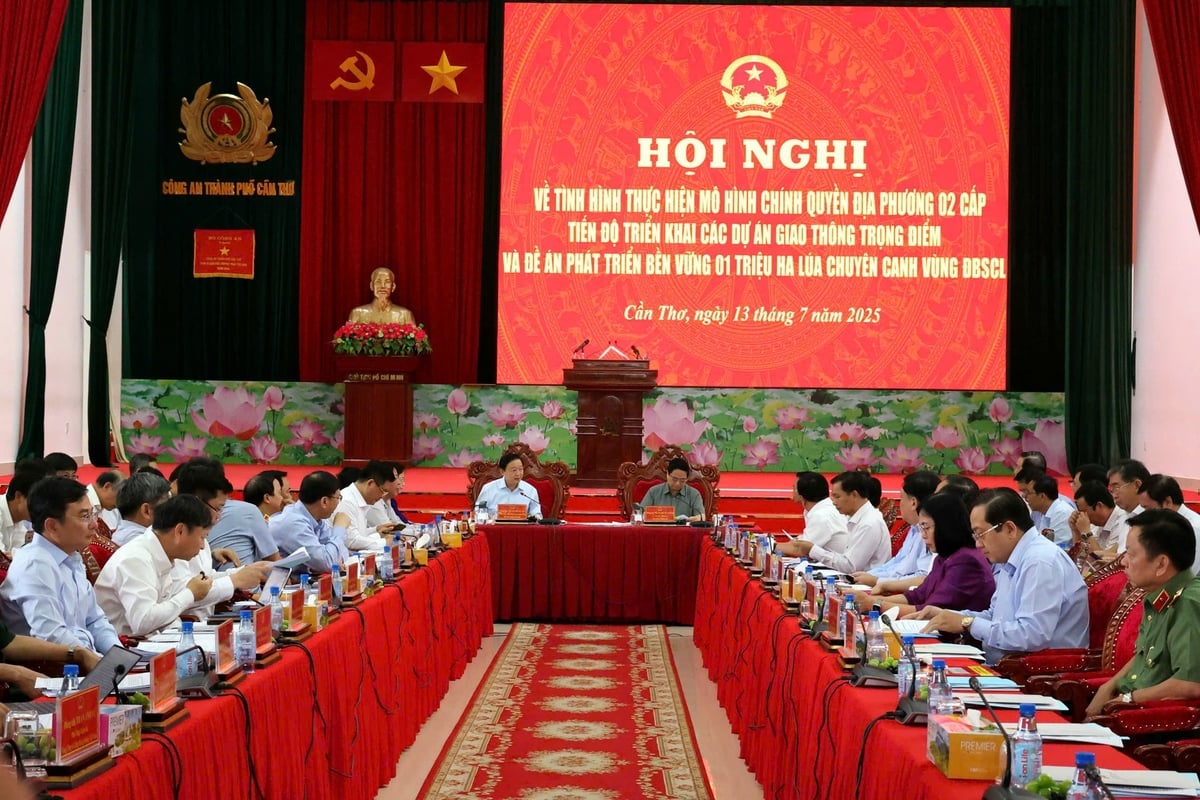
Pham Minh Chinh chaired a working program with ministries, branches and localities on Project for One million hectares of high-quality rice. Photo: Kim Anh.
Deputy Minister of Agriculture and Environment Tran Thanh Nam directly reported to the Prime Minister on some results achieved from the project's pilot models. Specifically, in the summer-autumn crop of 2025, the Ministry of Agriculture and Environment will continue to deploy 11 models in different ecological regions to evaluate sustainable farming processes and measure emission reductions carefully.
In addition, localities in the Mekong Delta have proactively deployed 101 pilot models, covering a total area of over 4,518 hectares. The models' results have all increased productivity by 5-10% and economic efficiency by 3-5 million VND/ha.
Typically, the pilot model in Dong Thap province shows that rice yield has reached 7.1 tons of rice/ha, an increase of 4% compared to outside the model. Farmers' profits are nearly 28 million VND/ha, a growth of 4.6-4.8 million VND/ha compared to outside the model. Production costs in the model are reduced by about 500 VND/kg of rice. The additional income from selling straw is 400 thousand VND/ha. The amount of emission reduction measured in this model is also about 3.13 tons of CO2/ha/crop.
In Can Tho city, as of June 2025, the area implementing the Project of One Million Hectares of High-quality Rice has reached about 76,000 hectares, with 12 models.
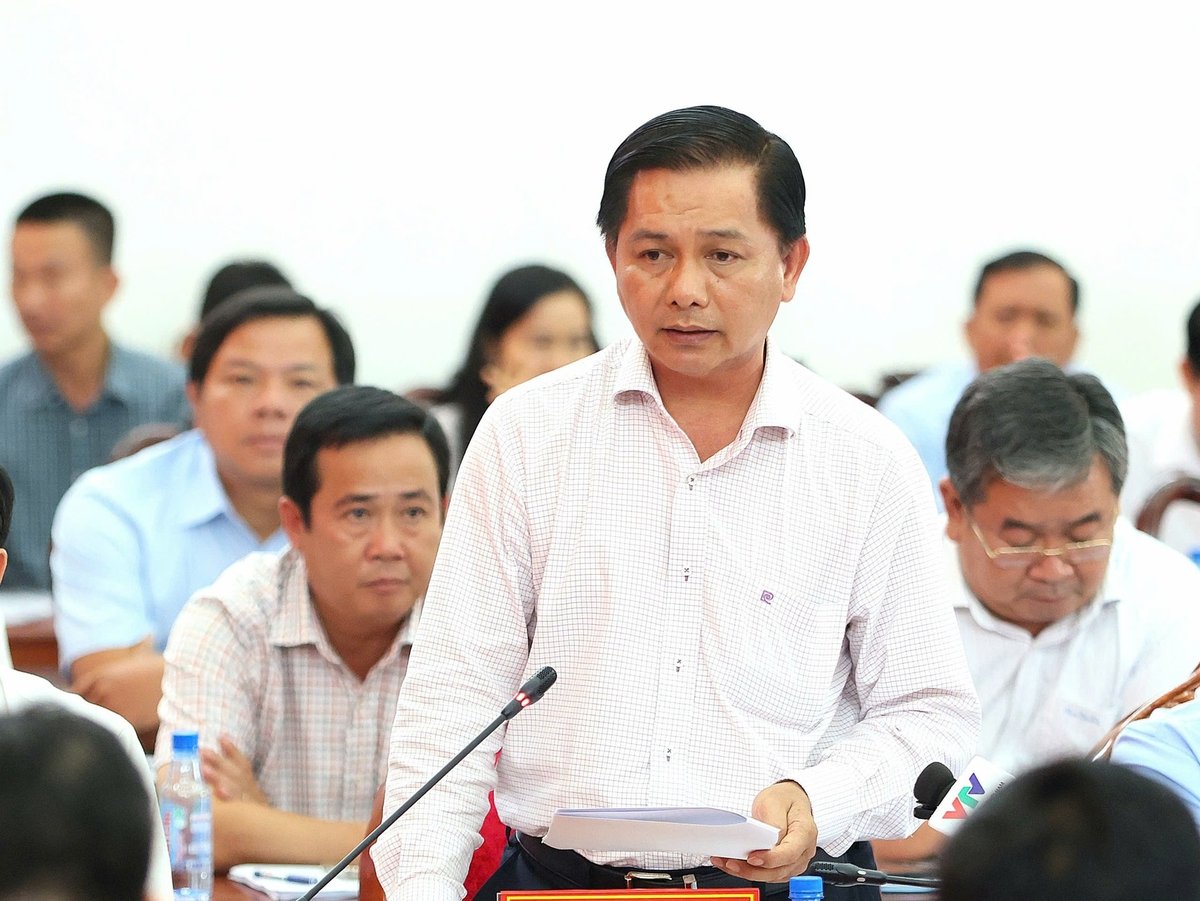
The Chairman of Can Tho city People's Committee reported to Prime Minister results achieved when implementing the Project of One Million Hectares of High-quality Rice. Photo: Minh Trung.
Rice yield in the models was 0.3-0.7 tons/ha higher than that of farmers cultivating using traditional methods. In terms of economic efficiency, total production costs in the models were reduced by an average of 1.1 million VND/ha. The model's profit was 1.3-6.5 million VND/ha higher than the control (equivalent to an increase of 6.6-36.7%) thanks to a 50% reduction in seed quantity, a 30% reduction in nitrogen fertilizer, a 2-3 times reduction in pesticide use, and a 30-40% reduction in irrigation water.
In particular, according to IRRI's results on greenhouse gas emission measurements, the models implemented in Can Tho City reduced 2-12 tons of CO2/ha. To date, the total area of the Mekong Delta localities registered to implement the project is 312,000 hectares, an increase of 112,000 hectares compared to the project plan (about 200,000 hectares by 2025). Notably, 60% of this area has been linked with businesses to supply input materials and consume output.
However, Deputy Minister Tran Thanh Nam said, “Currently, the models are facing difficulties in water withdrawal. There are localities that can only implement part of the cultivation process. According to the process, water must be withdrawn in three stages; however, the irrigation system, surrounding canals, and main canals are not currently guaranteed to implement this issue.
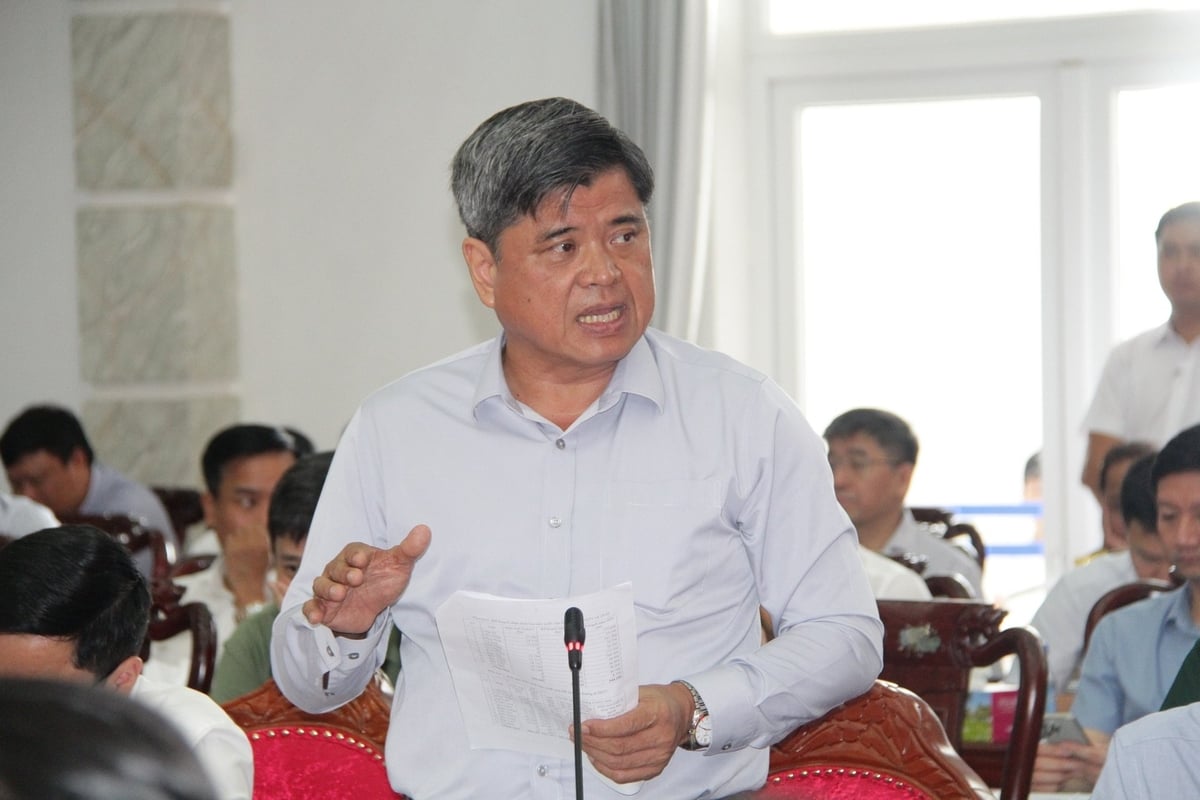
Deputy Minister Tran Thanh Nam proposed that Prime Minister resolve difficulties related to financial mechanisms for the Project of One Million Hectares of High-quality Ricet. Photo: Kim Anh.
Meanwhile, investment in irrigation systems is one important activity to promote the project's success. Recently, the Ministry of Agriculture and Environment has actively worked with the World Bank (WB) to mobilize capital, about 340 million USD, to implement the project "Infrastructure and technical support for high-quality and low-emission rice in the Mekong Delta."
Recently, the WB has committed to initially supporting Vietnam with about 50 million USD in non-refundable aid to implement the project. However, up to now, the Ministry of Agriculture and Environment has not been able to receive this capital due to policies related to financial issues. Therefore, Deputy Minister Tran Thanh Nam proposed that the Prime Minister direct the Ministry of Finance to send an official dispatch to the WB soon to have a plan to allocate capital, as well as coordinate with the Ministry of Agriculture and Environment and localities to continue preparing and completing the following procedures to receive the above aid capital. "If not done soon, when the investment period expires, the WB will transfer this 50 million USD capital to another country," Deputy Minister Tran Thanh Nam explained.
In addition, Deputy Minister Nam also proposed that the Prime Minister consider and agree on the policy of allowing the Ministry of Agriculture and Environment to access the mechanism of “Special Public Investment Project” stipulated in Article 7, amending and supplementing a number of articles of the Law on Public Investment No. 90/2025/QH15.
Affirming that the Project of One Million Hectares of High-quality Rice is unique in the world and also a source of pride for Vietnam, Prime Minister Pham Minh Chinh highly appreciated the initiative of the Mekong Delta provinces in implementing the models and the participation and positive response of farmers and cooperatives.
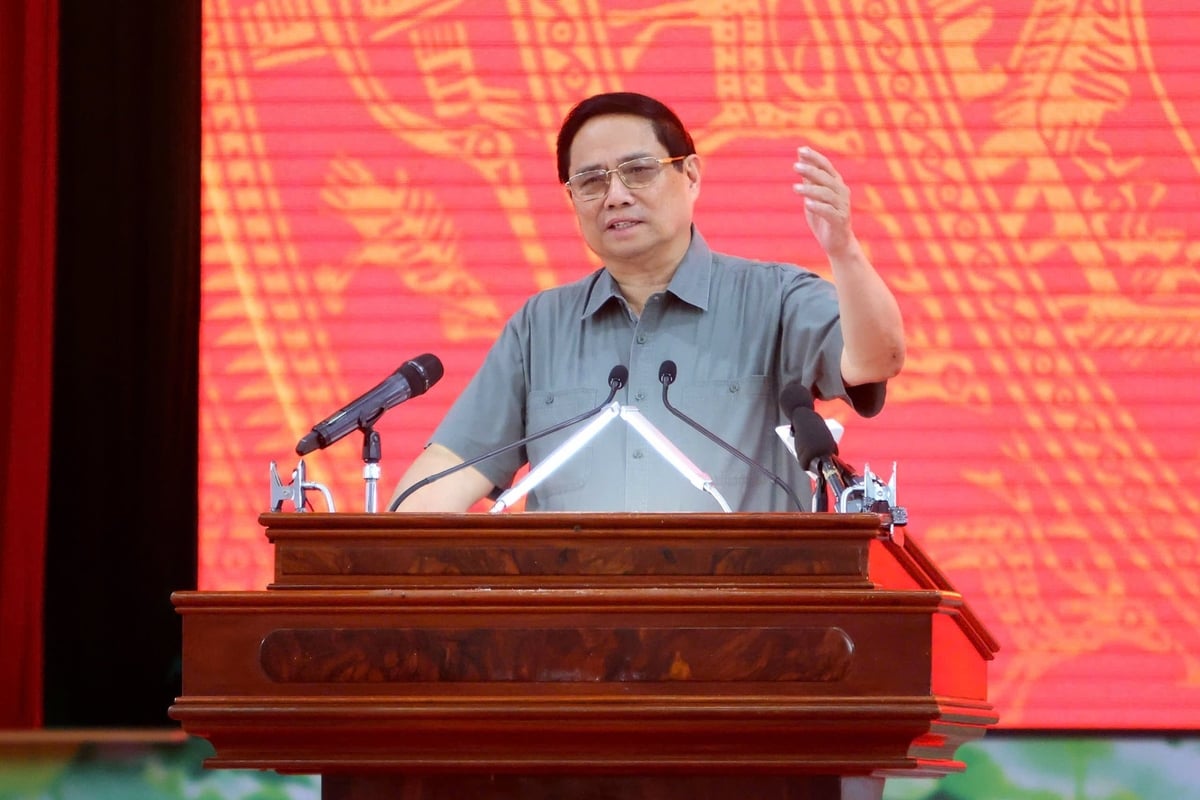
Prime Minister Pham Minh Chinh affirmed the significance of implementing the Project of One Million Hectares of High-quality Rice and directed key tasks to be carried out in the coming time. Photo: Kim Anh.
Prime Minister Pham Minh Chinh emphasized that all beginnings are difficult, and the first project to be implemented is also inevitable. However, the implementation of the project is very meaningful, not only in terms of material but also in terms of politics and spiritual values.
One, to ensure food security not only for Vietnam, but also for regional partner countries and international friends.
Two, the project creates a wide output, avoiding the problems of good harvest but low price or good price but bad harvest. If people have a scientific, methodical, and professional investment and development plan, the system will be highly efficient.
Three, to contribute to combating climate change, creating jobs, and stable livelihoods for people.
Four, to promote science and technology, innovation, digital transformation in agriculture, especially deep processing.
Five, to create regional and international linkages in the supply chain, diversifying production chains, markets, etc.
Six, to enhance the national rice brand.
From there, the Prime Minister set out many key and specific tasks for the Ministry of Agriculture and Environment, relevant ministries, and localities in the Mekong Delta region to implement the One million hectares of high-quality rice project in the coming time. The Prime Minister requested that localities complete the planning of the Project of One Million Hectares of High-quality Rice in the third quarter of 2025.
Relevant ministries must build a rice brand for Vietnam. In addition to the award-winning ST25 brand, which needs to be protected in a sustainable manner, new brands must be built and a Vietnamese rice brand in general must be created. The Ministry of Science and Technology in particular must contribute to building brands, attractive and eye-catching packaging designs, suitable for culture, national identity and easy to recognize.
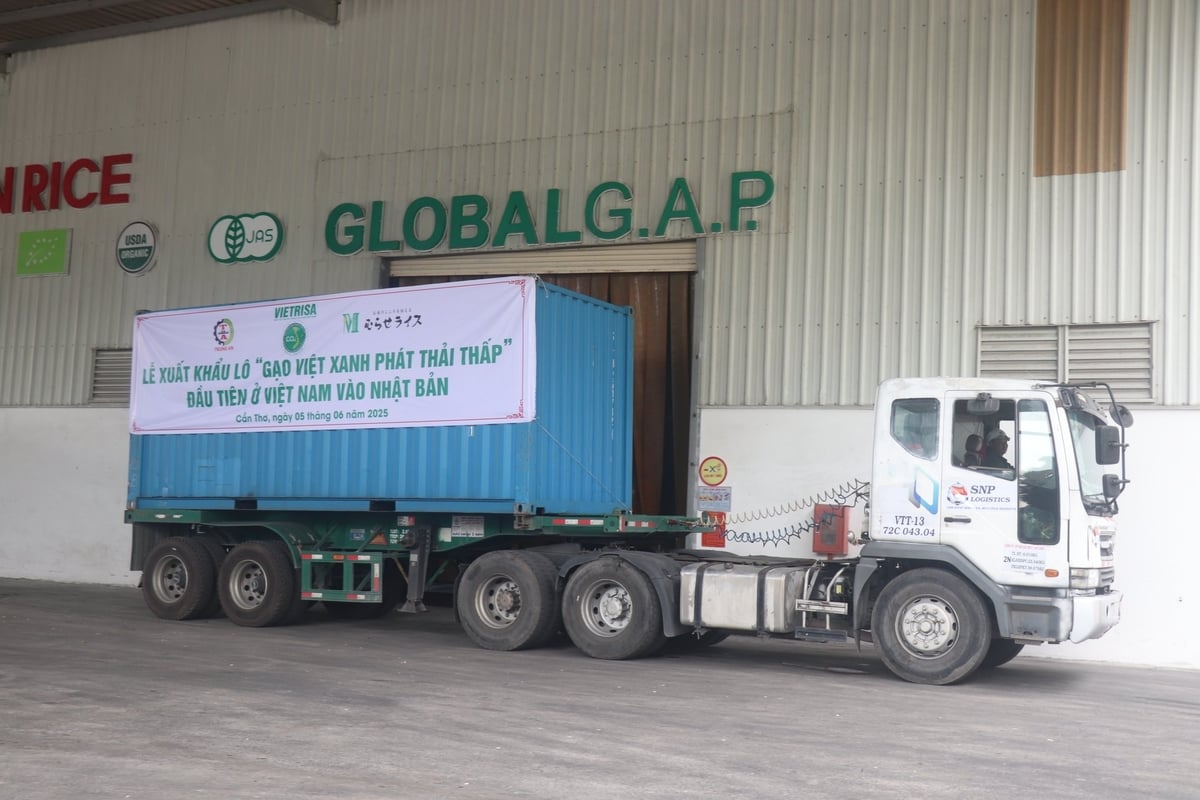
The first batch of emission-reducing rice from the Project of One Million Hectares of High-quality Rice was exported to Japan. Photo: Kim Anh.
Regarding mobilizing resources for the project and the recommendations of the Ministry of Agriculture and Environment, Prime Minister Pham Minh Chinh assigned the State Bank to develop preferential policies for the project. The Ministry of Finance is responsible for resolving issues related to borrowing capital from international organizations, including the initial aid commitment of USD 50 million from the World Bank.
Prime Minister Pham Minh Chinh also directed the Ministry of Industry and Trade to immediately implement the signing of long-term agreements on rice, ensuring stable output for farmers. For enterprises, the Prime Minister requested to ensure input supply and output consumption for the project.
Up to now, 620 cooperatives (phase 1) and 1,300 cooperatives (phase to 2030) have participated in the Project of One Million Hectares of High-quality Rice. In addition, the Ministry of Agriculture and Environment has identified a list of nearly 200 enterprises participating in the project, of which about 40% are agricultural product consumption enterprises with a joint scale of 200 hectares or more.
In the coming time, the Ministry of Agriculture and Environment will review and complete the emission reduction farming process for the project area; complete and issue guidelines on emission measurement, reporting and verification (MRV) for high-quality rice cultivation; develop and implement a strategy to develop a low-emission Vietnamese rice brand; advise and propose a pilot policy and mechanism for carbon credit payment based on results for high-quality rice specialized areas, policies and pilot mechanisms for carbon credit exchange for the rice industry, etc.
Translated by Kieu Chi
/2025/12/29/0829-2-000508_274.jpg)
(VAN) Hai Phong is tightening management, with 100% of fishing vessels licensed and equipped with vessel monitoring systems, joining the national effort to lift the EC's 'yellow card.'
/2025/12/27/2744-1-121716_241.jpg)
(VAN) The Viet Nam Environment Protection Fund is the national environment protection fund and a state financial institution under the Ministry of Agriculture and Environment.
/2025/12/27/2015-2-111213_813.jpg)
(VAN) In efforts to realize the goal of Net Zero emissions, reducing urban emissions is regarded as a key solution.

(VAN) Deputy Prime Minister Tran Hong Ha requested to design the EPR mechanism toward a circular economy that is transparent, feasible, and non-administrative and aligned with actual recycling capacity.

(VAN) On December 24, Deputy Prime Minister Tran Hong Ha chaired a meeting about approving greenhouse gas emission quotas for 2025 - 2026 period.

(VAN) As Viet Nam enters a new era, the national agricultural sector must proactively adapt to global trends to transform current challenges into strategic development opportunities.
/2025/12/18/5046-3-154320_307.jpg)
(VAN) Granting planting area codes is a solution that helps Lao Cai manage forests effectively while also laying a data foundation to support the development of the carbon credit market in the future.